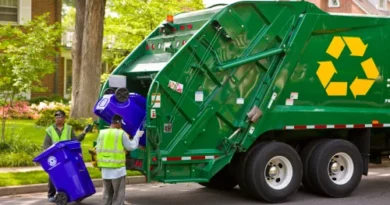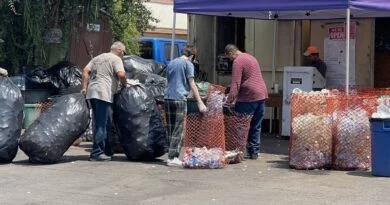Navigating the Profitable Path of Waste Management Stocks
Waste management stocks can be a profitable investment for those looking to make a positive impact on the environment while also earning a return on their investment. However, navigating the world of waste management stocks requires analytical decision-making skills and a thorough understanding of environmental permits and the FIFO inventory method.
In this article, we will explore these topics and provide tips for successfully investing in waste management stocks, with a focus on Waste Management Michigan. Analytical decision-making is a critical skill for investors in any sector, but it is particularly important in the waste management industry.
One of the primary issues associated with waste is the significant amount generated worldwide. According to the World Bank, global waste generation is expected to increase to 3.4 billion tons by 2050, which represents a significant challenge for waste management systems worldwide. This growth in waste generation is driven by several factors, including population growth, urbanization, and changes in consumption patterns.
The improper disposal of waste can cause a range of negative environmental impacts, such as air, soil , and water pollution. The accumulation of waste in landfills can produce methane, a potent greenhouse gas that contributes to climate change. Waste can also have harmful effects on human health, such as the spread of diseases through the breeding of insects and rodents.
Additionally, the economic impacts of waste mismanagement are substantial, such as the loss of resources and potential revenue from recycling and reuse. Effective waste management involves the implementation of a waste hierarchy that prioritizes waste reduction, reuse, and recycling. This approach aims to minimize the amount of waste generated and promote the efficient use of resources.
Waste reduction strategies include reducing the consumption of single-use products, promoting sustainable production practices, and encouraging responsible consumer behavior. Reuse strategies involve repurposing products or materials for their original or alternative uses, such as donating clothes or refurbishing electronics.
Recycling involves the conversion of waste materials into new products, such as using recycled paper to produce new paper products. To support effective waste management, governments and organizations can implement policies and programs that promote waste reduction, reuse, and recycling. Such initiatives can include the development of waste management infrastructure, public education campaigns, and financial incentives for waste reduction and recycling.
Waste is a significant challenge that requires effective management to minimize its negative impacts on the environment, human health, and the economy. The implementation of a waste hierarchy that prioritizes waste reduction, reuse, and recycling, coupled with policies and programs that promote sustainable waste management, can help to achieve this goal.
In addition to the waste hierarchy and policies and programs, there are several other key strategies for managing waste effectively. One important approach is the use of waste-to-energy technologies, which involve converting waste into energy through processes such as incineration or gasification. These technologies can help to reduce the amount of waste sent to landfills, while also providing a source of renewable energy.
Another important strategy is the development of circular economy systems, which aim to reduce waste by maximizing the use of resources and minimizing waste generation. This involves designing products and production processes with the aim of reusing and recycling materials, reducing energy consumption, and minimizing waste generation.
Effective waste management also requires the engagement and participation of various stakeholders, including individuals, communities, businesses, and governments. Individuals can make a significant impact by practicing responsible waste disposal, such as separating recyclable materials from non-recyclables and disposing of hazardous waste appropriately.
Communities can also support effective waste management by organizing waste collection and disposal services, promoting waste reduction and recycling programs, and supporting the development of waste management infrastructure. Businesses can also play a critical role in waste management by implementing sustainable production practices, such as reducing packaging waste and using environmentally-friendly materials.
Governments can support effective waste management by implementing policies and regulations that promote waste reduction, reuse, and recycling, providing funding and incentives for waste management infrastructure, and enforcing waste disposal regulations.
Effective waste management is a complex issue that requires the implementation of multiple strategies, including the waste hierarchy, waste-to-energy technologies, circular economy systems, and stakeholder engagement. By working together and implementing these approaches, we can minimize the negative impact of waste on the environment, human health, and the economy, and create a more sustainable future for all.
Navigating the Profitable Path of Waste Management Stocks

Waste management companies face a unique set of challenges, including regulatory compliance, environmental concerns, and technological innovations. To make informed investment decisions, it is essential to conduct thorough research and analysis.
One key aspect to consider when evaluating waste management stocks is the company’s track record in environmental compliance. Investors should look for companies that have a history of complying with regulations and working proactively to reduce their environmental impact. This includes investing in new technologies and processes that can help reduce waste and mitigate the negative effects of waste disposal.
Environmental permits are another critical consideration for waste management stocks. Companies in this sector must obtain various permits and licenses to operate, including permits for waste disposal, air emissions, and water discharges. Failure to obtain and maintain these permits can result in significant fines and penalties, as well as damage to the company’s reputation.
Investors should look for companies with a strong track record of environmental compliance and a solid reputation for obtaining and maintaining the necessary permits. It is also essential to stay up-to-date on any changes to environmental regulations that could impact the waste management industry.
The FIFO inventory method is a commonly used accounting method in the waste management industry. FIFO stands for “first in, first out,” and it refers to the way that inventory is valued and tracked over time. Under this method, the oldest inventory items are assumed to be sold first, while the newest inventory items remain in stock.
For waste management companies, the FIFO method is particularly important because it allows them to accurately track the value of their inventory over time. This is crucial for financial reporting and for making informed decisions about purchasing and pricing. Waste Management Michigan is a leading provider of waste management services in the state of Michigan.
The company offers a wide range of services, including landfill disposal, recycling, and composting. Waste Management Michigan is known for its strong commitment to environmental sustainability and has received numerous awards and accolades for its efforts.
Investors interested in Waste Management Michigan should conduct thorough research and analysis to evaluate the company’s financial performance, regulatory compliance, and environmental record. It is also essential to stay up-to-date on any changes to environmental regulations that could impact the company’s operations.
Read Also: Health Benefits Of Bug Juice Drink
Investing in waste management stocks can be a profitable and rewarding experience for those who are committed to making a positive impact on the environment. However, it requires analytical decision-making skills and a thorough understanding of environmental permits and the FIFO inventory method.
By conducting thorough research and analysis and staying up-to-date on industry trends and regulatory changes, investors can make informed decisions and navigate the profitable path of waste management stocks. In addition, there are a few other factors that investors should consider when evaluating waste management stocks.
Firstly, it’s important to look at the company’s growth potential. Waste management is a rapidly growing industry, driven by increasing public awareness of environmental issues and the need for sustainable waste management solutions. Investors should look for companies that are positioned for long-term growth and have a solid plan for expanding their operations.
Secondly, it’s essential to consider the competitive landscape of the waste management industry. While waste management is a highly regulated industry, there is still significant competition among companies vying for contracts and customers. Investors should look for companies with a strong market position and a competitive advantage, such as advanced technology or a strong brand reputation.
Finally, it’s important to consider the financial health of the company. Waste management is a capital-intensive industry, with high costs associated with acquiring and maintaining landfills, waste processing facilities, and other infrastructure. Investors should look for companies with a strong balance sheet, solid cash flow, and a history of generating consistent profits.
In summary, investing in waste management stocks can be a lucrative and rewarding experience for those who are committed to making a positive impact on the environment. By evaluating the company’s regulatory compliance, environmental record, financial health, and growth potential, investors can make informed decisions and navigate the profitable path of waste management stocks
Read Also: Household Waste Complete Management Guide


